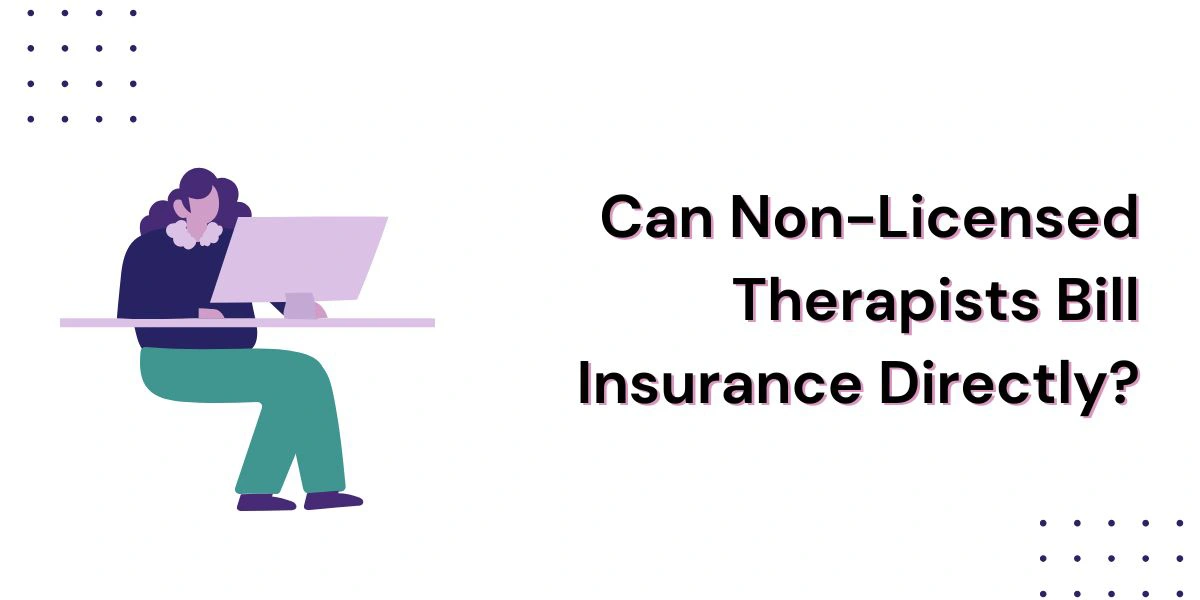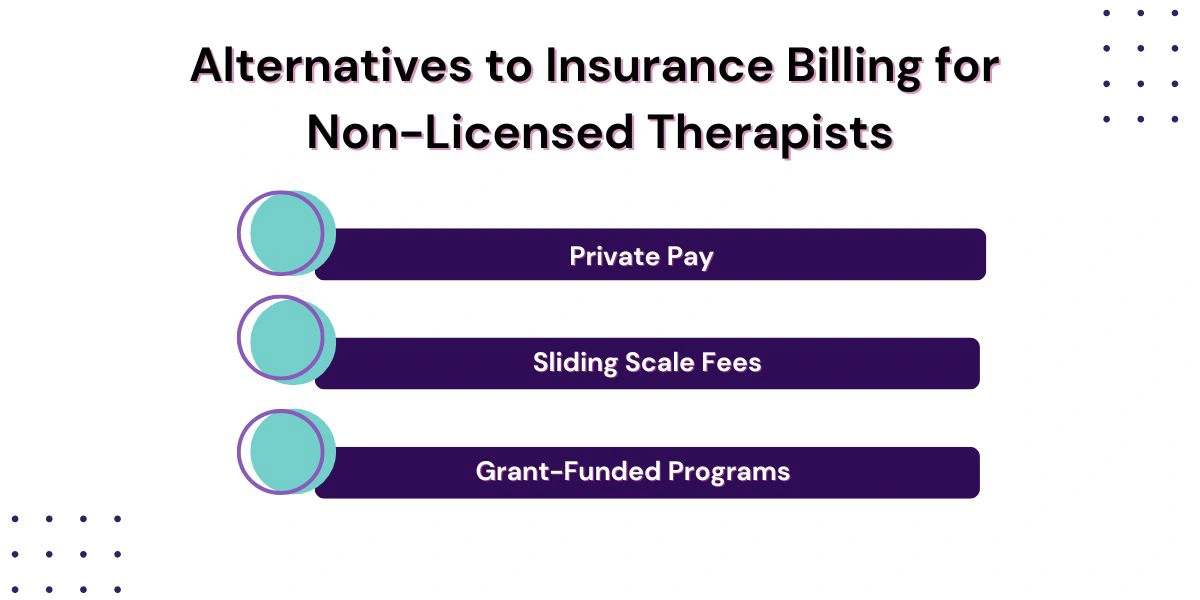Blog

If you’re managing a practice or mental health clinic, dealing with insurance billing can be complicated. One common question providers and practice managers frequently ask is whether a non-licensed therapist can bill insurance for their services. The answer isn’t straightforward—insurance billing involves a variety of rules, regulations, and requirements that differ widely depending on insurers, state laws, and service types.
What Exactly is a Non-Licensed Therapist?
First, it’s essential to clarify what we mean by “non-licensed therapist.” Generally speaking, non-licensed therapists are mental health professionals who have not yet acquired official state licensure but might hold other credentials such as a master’s degree or certification in fields like counseling, social work, marriage and family therapy, or psychology. These individuals often practice under supervision as part of their training or to fulfill requirements for licensure.
Common examples of non-licensed therapists include:
- Interns or trainees currently enrolled in a master’s or doctoral program.
- Associates or registered mental health counselors working toward licensure.
- Certified professionals whose scope of practice is regulated but not officially licensed (e.g., certified drug and alcohol counselors).

Can Non-Licensed Therapists Bill Insurance Directly?
Generally, non-licensed therapists cannot bill insurance directly under their own credentials. Insurance companies typically require providers to hold state-issued licensure, verifying they’ve met extensive educational, training, and ethical standards. Without these credentials, insurance companies are reluctant or entirely refuse to reimburse for provided services.
However, this does not mean services rendered by non-licensed therapists are always ineligible for insurance billing. There are specific conditions where these services can still be billed, often under the supervision of a licensed therapist.
Billing Under Supervision
One of the most common pathways for non-licensed therapists to bill insurance is through supervision. Under this scenario, a licensed professional supervises the services provided by non-licensed therapists and bills under their own license and National Provider Identifier (NPI).
This supervised billing requires:
- Clear documentation of supervision by a licensed clinician.
- Regular review and approval of treatment plans and session notes.
- Compliance with insurance company guidelines for supervised services.
For example, in some states, a licensed clinical social worker (LCSW) or licensed marriage and family therapist (LMFT) may oversee therapy sessions conducted by interns or associates and subsequently bill insurance companies under their own credentials. The billing documentation must explicitly note the supervisory arrangement and the involvement of the licensed clinician.
Understanding Insurance Company Requirements
Insurance company policies vary significantly regarding reimbursement for supervised services. Some insurers readily reimburse for therapy services provided by interns or associates under licensed supervision, while others have strict restrictions or do not reimburse these services at all.
Factors that typically influence insurance policies include:
- State-specific insurance regulations.
- The insurer’s internal policies regarding supervised therapy.
- The specific license type and qualifications of the supervising therapist.
Before billing insurance for services by non-licensed therapists, always confirm each insurer’s policy and guidelines to avoid denial of claims and potential compliance issues.
Potential Limitations and Restrictions
Even when billing under supervision is permitted, there are often limitations to keep in mind:
Scope of Practice
Non-licensed therapists typically have a restricted scope of practice defined by their educational level, professional training, and state law. Insurance companies will only reimburse for services clearly within the supervised individual’s scope of practice.
Supervision Requirements
Insurance companies often mandate specific supervision requirements, including:
- Frequency of supervision meetings.
- Methods of supervision (e.g., individual vs. group).
- Documentation and record-keeping standards.
Failure to strictly adhere to these requirements can result in denied claims and audits.
Lower Reimbursement Rates
Services billed under a supervisor’s credentials might be reimbursed at a lower rate compared to sessions directly provided by licensed clinicians, reflecting perceived differences in experience, credentials, and risk.
Documentation is Key
Proper documentation is crucial when billing supervised services. Your documentation must clearly show:
- The licensed clinician’s involvement in supervision.
- Regular supervision meetings and review of treatment notes.
- The explicit acknowledgment of the non-licensed therapist’s role in service delivery.
Thorough and accurate documentation not only facilitates smoother claims processing but also protects your practice during audits.

Alternatives to Insurance Billing for Non-Licensed Therapists
If billing insurance under supervision proves too complex or restrictive, there are alternatives to consider:
- Private Pay: Many practices choose private pay arrangements for non-licensed therapists, clearly communicating upfront with clients about the billing arrangement and costs.
- Sliding Scale Fees: Offering sliding-scale fee arrangements can attract clients who might otherwise prefer insurance-covered services. Clearly defined fee structures help maintain transparency and client satisfaction.
- Grant-Funded Programs: Non-licensed therapists may participate in grant-funded mental health programs, allowing them to provide services without directly dealing with insurance billing complexities.
Best Practices for Billing for Non-Licensed Therapists
Here are some practical tips for successfully navigating insurance billing with non-licensed therapists:
- Confirm Insurance Policies Regularly: Insurance company policies often change. Regularly verify coverage and reimbursement policies for supervised sessions.
- Establish Clear Protocols: Develop clear internal protocols for supervision and billing practices. Ensure all team members understand and follow these protocols.
- Invest in Training: Regularly train your billing team and clinicians in current insurance billing practices to reduce errors and improve compliance.
- Maintain Robust Documentation: Implement robust record-keeping practices that can withstand insurance audits and reduce claim rejections.
Handling Billing for Non-Licensed Therapists
So, can a non-licensed therapist bill insurance? Generally not directly—but under the right conditions, and with appropriate supervision and documentation, services rendered by non-licensed therapists can often be reimbursed. Understanding insurance company requirements, maintaining strict adherence to supervision protocols, and utilizing robust documentation are essential for successful billing.
If your practice needs support navigating these complexities, Hansei Solutions is here to help. Contact us today to learn more about streamlining your billing processes and improving your practice’s financial health.

Ready to focus on providing healthcare? Let us lighten your load.
We’re here to address your pain points and create growth opportunities for your organization. We’re passionate about what we do, and it shows in every interaction. Learn what makes us tick and schedule a demo today.